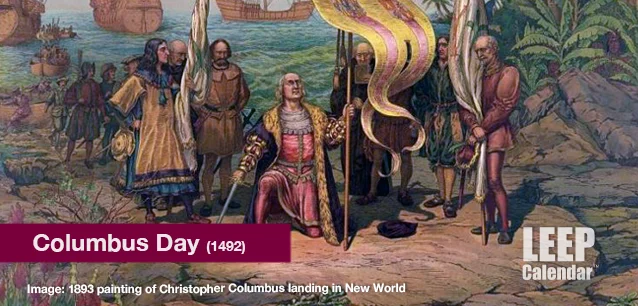 AD
AD
Today is: December 25
Scroll to explore events active on this date.
Additional Events on LEEP
LEEP INK FEATURES

August? Absolutely!
In August, we live through the Dog Days of Summer. It's hot and often humid, and those who can leave for better climates do. Down south, winter is in full force. August is also known as "the ...

In The Heat of July: July 2025 Events
Is it hot enough (or cold enough if you're below the equator) for you yet? There is actually a day for that! Like every month, I pick a diverse collection of events you may or may not know about. This ...

May Blooms: Events in May 2025
Along with October, May is one of the most densely packed months of the year. It's before the summer humidity and the last whole month of the school year. The weather is warming in t...
About National Columbus Day
Culture & Art , Politics
United States , Mexico & Central America
Ends: Oct 10, 2022
DESCRIPTION:
INDIGENOUS PEOPLES DAY (FORMERLY COLUMBUS DAY)
Date: October 10
Location: United States
Columbus Day / Discovery Day / Friendship Day / Día de la Hispanidad / Día de la Raza / Native American's Day / Discover's Day
Date October 12
Locations: Belize, Mexico, Bahamas, Puerto Rico, Virgin Islands, Spain, South Dakota & Hawaii, United States
Champions: Sovereign nations. Historical Anniversary.
Columbus Day was an official holiday in the United States, created by a joint Congressional/Presidential resolution on April 30, 1934, and modified in 1968 (36 USC 107). It was always the second Monday of October.
The day commemorates the events of October 11-15, 1492, when Christopher Columbus and his crew first sighted land. Landfall occurred on October 12, 1492; he thought he had found a way to India. He found the Bahamas.
It would take time for him to realize he had found an entirely new continent. Columbus Day on October 12, is a national holiday in Belize. The Bahama's refer to it as Discovery Day. In Spain, it is called Día de la Hispanidad. In the Virgin Islands and Puerto Rico, it is called Friendship Day. Mexico refers to the anniversary as Día de la Raza, or Day of Race. The United States also marks the anniversary with Native American Day and the state of Hawaii with Discovers' Day.
FIRST EUROPEANS
Most Americans believe that Columbus was the first European to discover America. No. He's the first to find the islands of the Caribbean, but not mainland North America.
The first European to land on American soil was Leif Eriksson, a Viking on October 9, 1000 AD. He called the new land Helluland (Stone Slab Land). Eriksson spotted it a year before when his ship was blown off course leaving Iceland, but did not land. The following year, he returned sailing south and eventually set up camp in what we refer to as present-day Newfoundland, which he called Vinland since it was bursting with good wine grapes. Archeologists in the 1960s uncovered the original camp in modern L'Anse aux Meadows, a UNESCO world heritage site today.
In 1964 President Lyndon Johnson proclaimed October 9 as Leif Eriksson Day. On October 9, 1825, the first group of immigrants from Norway arrived in the United States.
Eriksson wasn't the first European to see America. That honor falls to another Viking, Bjarni Herjolfsson. Herjolfsson saw a land covered in trees in 986 AD. He was trying to get to Greenland, with his father, Erik the Red. He missed it. However, Herjolfsson did not set foot on American soil; that would have to wait another 13 years.
CONTROVERSY OVER COLUMBUS
Columbus Day has become controversial in the United States because his discovery also led to the genocide of Native Americans, who lost 90% of their people over the next 400 years due to illness, enforced poverty, land theft, discrimination, and wars. That Columbus initiated colonialism, which led to slavery and the disenfranchisement of Native Americans, is another reason several groups do not want the day remembered. However, Columbus Day is significant to Italian Americans, who view the explorer with great pride. An Italian, he sailed to America under the patronage of the Spanish King and Queen.
The Black Lives Matter movement, Native American organizations, and other social justice movements continue to call into question Columbus' legacy and advocate for the abolition of the holiday. As near as I can tell, the state of Alabama was the first state to change the name to honor America's indigenous people.
In 2021, after a rise of activism to recognize indigenous people in the United States rather than their colonizers, President Biden proclaimed the first ever National Indigenous Peoples' Day in place of Columbus Day.
VIDEOS
Currently, this event does not have supporting videos.
SUPPORTING DOCUMENTS
Currently, this event does not have supporting documents.
ADDITIONAL IMAGES
Currently, this event does not have supporting images.
Where would you like to go now?
 AD
AD


/footer-logo.svg)
